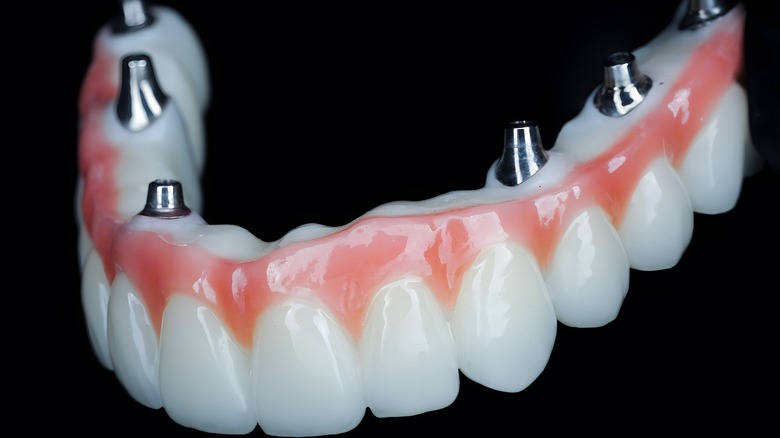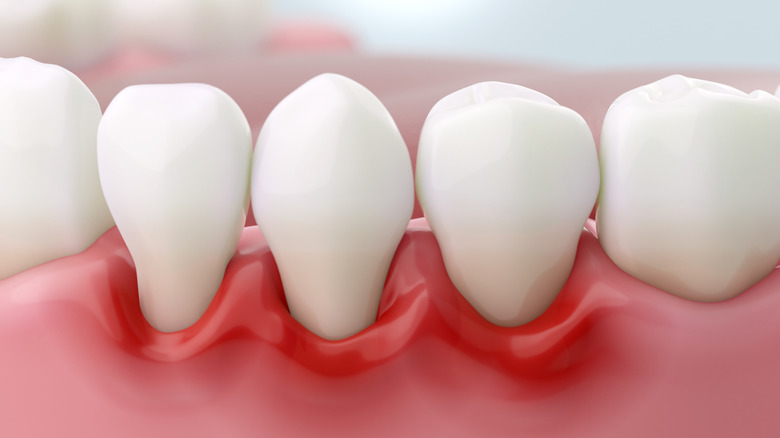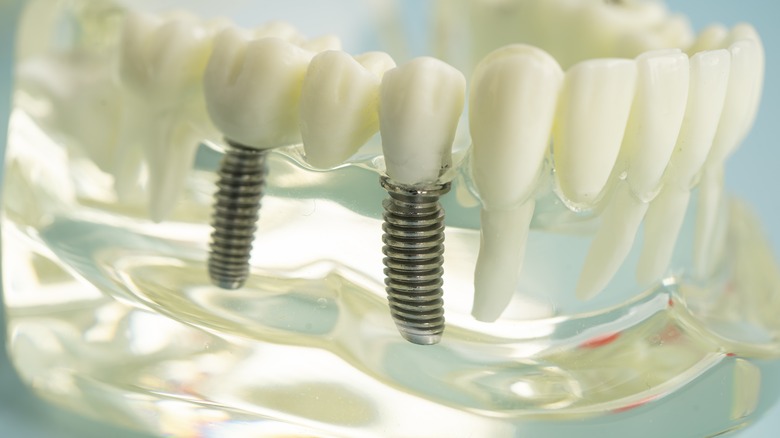Sneaky Factors That Can Hike Up The Cost Of Dental Implants
You've just received a flyer in the mail about the discount your local dental clinic is offering on implants. Before you make an appointment, consider some of the ways that an implant could end up costing you far more than advertised. The clinic isn't aware of how much of the cost your insurance policy or Medicare will or will not cover. For example, are you aware that you could pay considerable out-of-pocket expenses if you need general anesthesia as opposed to local anesthesia? The flat rate on the flyer probably doesn't include extra consultation meetings or ongoing follow-up visits. Also, the cost of the advertisement is likely based on the use of the least expensive implant material. If you opt for the more modern material, you'll pay more.
And, of course, the clinic doesn't know your overall dental health. Unless you have gums and jawbones that are ideal, additional procedures may be necessary to increase the odds of a successful implant. Each procedure could carry a sizable price tag, adding to your total. Even after receiving your implants, there could be additional costs because not all implants are initially successful. Sometimes the gums or bones don't respond well to surgery and the implants may require repositioning.
These warnings are not to dissuade you from receiving implants. Whether you get implants is a personal decision. They can be life-changing prostheses for some people. But prepare yourself and your monthly budget by reviewing the sneaky factors that can hike up the cost.
The type of dentist can influence pricing
Just as you wouldn't be surprised to learn that a highly-experienced lawyer charges more per hour than a recent law school graduate, you shouldn't be shocked to learn that dentists with many years of practice tend to have higher prices for dental implant procedures than their beginner colleagues. Often, you'll find dentists with a long track record working in spacious, attractive offices. With large offices come large staffs, which means the dentist must earn enough to cover a huge payroll. There's also the monthly rent or mortgage payment, along with the cost of modern dentistry equipment.
Dentistry also follows the overall pattern of the medical industry, with specialists routinely demanding more for their services than generalists. So, while you may gasp at the prices of a respected family dentist, those prices likely pale in comparison to those set by dental specialists, such as maxillofacial surgeons. After graduating from regular dental school, they generally have a medical residency of four to six years. Then, if they want to have a narrowly focused practice, like cosmetic surgery, they'll have to invest another two years. By the time they're ready to open a private practice and welcome you as a patient, they've amassed such a huge overhead that it isn't difficult to understand why they would charge more for your dental implants than most family dentists.
Your geographic location can affect procedure prices
Just as home prices and the cost of groceries vary throughout the U.S., so does the cost of medical care. Health insurance differs from state to state and from urban to rural areas. The cost of health insurance is expected to rise while tax credits are scheduled to drop at the beginning of 2026. The New Century Foundation examined 32 states and found that patients living in rural areas will pay an average of 107% more out-of-pocket. The expected average increase for urban dwellers is 89%. So, if rural and urban patients had the same insurance but lived in different settings, the rural resident could pay significantly more for the same procedure.
Also, if you live in an area with a high cost of living, don't be surprised to find your dental implants cost far more than those offered by dentists in less-affluent neighboring areas. On the other side of the equation are cities with a lower cost of living, such as Springfield, Illinois; Laredo, Texas; and Cedar Rapids, Iowa. One of the factors influencing the cost of dental work in the major cities is the cost of real estate. If dentists own their buildings, they may have large mortgages. And if they rent, they may have skyrocketing rental payments. In either case, the cost is typically passed along to you, the patient, and your monthly budget.
You could need more office visits than you anticipate
The number of office visits is generally based on the complexity of your situation and the comfort level of the dentist. If your dental needs are more than average, and your dentist is more exacting than is typical, your number of office visits prior to surgery could climb. If this dentist is new to you, the pre-surgery visits may be even more extensive. First, the dentist wants to become acquainted with your overall medical background to ensure there are no pre-existing conditions that could hinder either the procedure or recovery from the operation. If there is a medical concern but the problem is manageable, the dentist may encourage you to work with your general practitioner or a specialist in the appropriate field to improve your condition. Then, only after you're in better health, the dentist will pursue additional pre-surgery prep work.
If smaller procedures are necessary before you can receive implants, the dentist will likely perform them progressively. It's important to allow enough time between each procedure for your mouth to heal fully. When you return, the dentist will assess the recovery and advise you whether it's okay to proceed with the next step or allow more time for your body to adjust. The dentist's caution and patience will likely pay dividends for you in the long run. However, they do contribute to the number of office visits and the increase in the total cost of your dental implants.
Your X-rays and 3D imaging may not be covered in full by insurance
Even if you've had a set of X-rays with your regular dental checkup, more X-rays may be necessary to offer unambiguous images of the area where your medical provider will anchor your dental implants. Unfortunately, not all insurance policies cover X-rays 100%. When talking with your insurer, you'll have to specify the type of images the dentist wants. Some policies may cover traditional X-rays, but not more current digital images. They may also place a cap on how frequently you can have images made.
There's a good chance your dentist will insist on producing 3D images, which are a vast improvement over old-school X-rays, referred to as 2D images. X-rays give the dentist a good idea of the suitability of a proposed implant site, but there are potential obstacles that they don't detect well. According to Dental.com, 3D images increase the likelihood of success by equipping the dentist with precise information about the height, width, and density of sensitive areas needing special attention.
During surgery, a dentist relying solely on X-rays could at the last moment find that the scheduled site for the new tooth is too small to host a regular-sized implant. The dentist will then have to perform a second procedure, creating unnecessary discomfort and increasing stress on the body to heal multiple areas simultaneously. In contrast, the accuracy of 3D images can reduce the chances of surgical complications and increase the odds of long-term success.
You may need multiple implants instead of only one
Don't be misled by a dentist's advertisement regarding low prices for dental implants. Often, the ad refers to replacing only one tooth, not multiple teeth. For example, Authority Dental estimates the 2025 price of a single dental implant to be from $3,500 to $6,700. However, replacing all the teeth in either the upper or lower jaw costs from $10,000 to $21,500. Double that if you need to replace both upper and lower teeth.
But why choose to have a full-mouth implant when dentures would be much cheaper? Implants can give you a stronger bite than dentures, allowing you to enjoy favorite foods you've been avoiding. They can also offer greater reliability. They can't slip and slide like conventional dentures, causing discomfort and embarrassment. Implants are also more convenient to clean since you can brush them as you would your natural teeth. On the other hand, dentures require removal, special cleaning substances, and proper storage. These comparisons and more lead people to choose dental implants over dentures. However, there's no escaping the higher cost for full implants.
You could be pressured into receiving unnecessary procedures
Preparing for dental implants can require other prerequisite procedures. For example, unhealthy teeth may need removal to make room for replacement teeth. But you should verify that only teeth that can't be repaired are targeted for removal. In such cases, extraction is the only option. But dentists are ethically required to save any teeth that haven't passed the point of no return. Sadly, some dental offices put profit ahead of dental health by suggesting to patients that they should have healthy teeth removed and replaced with implants.
CBS News and KFF Health News conducted a joint investigation in 2024, highlighting the common practice of overselling the value of implants. According to the report, potential patients were forced to meet with salespeople and sign finance agreements before being allowed to speak with the dentist who would perform the procedure. At several large clinics, dental implants were performed by general dentists who were not required by their states to have any special training in dental implants. Dental experts interviewed for the investigation repeatedly mentioned how shockingly bad some of the surgeries were performed. Disgruntled patients had no choice but to find other more experienced dental professionals to perform corrective surgery.
You may need other procedures before the implants
Before you can receive dental implants, you may be in legitimate need of other treatments. For example, you might suffer from gum disease, require bone grafts, or need a sinus lift. According to the National Library of Medicine, the gum disease periodontitis weakens the tissues of the gum that are most in contact with teeth, destabilizing the tooth. If the disease goes untreated, research shows it will also negatively impact implants. However, once the condition is under control, in most cases, implants are still a possibility. Not only will the initial treatment add to your implant costs, but so will follow-up visits. Dentists have to closely monitor periodontitis to prevent it from causing additional damage.
If you've lived with missing teeth for several years, you have experienced bone loss. Once a tooth vacates its location, the body reroutes calcium supplies. The calcium that would have been used to keep that part of the gum strong and healthy is sent to other parts of the body. As a result, the jaw in that area begins shrinking. If it shrinks too much, it won't have the ability to support implants. The solution is a bone graft where your health provider removes healthy bone from elsewhere and relocates it to the gum. Sometimes, the sinus cavity is in the way. Doctors then perform a sinus lift where the cavity is raised to make room for the additional bone. These types of procedures and follow-up visits will increase the cost of your implants.
Dental implant materials differ in cost
Zirconium, a type of ceramic, has become a popular material for implants due to its convenience. However, that innovation comes with a heavier price tag. On the other hand, titanium has long been the industry standard. Titanium is known as a biocompatible metal because it's easily accepted by the human body. In the case of implants, it means that the jawbone tissue doesn't typically react to titanium as if it were a dangerous foreign substance.
So why might your dentist steer you away from titanium and advise you to use zirconium? If you have thin gums that allow light to pass through, it's possible that people will notice the metal posts used with titanium implants. However, zirconia implants, though not pink, but white, offer less contrast with the gums and are therefore less noticeable. They look a little more like a tooth's natural root. Zirconium implants also have an even better reputation for being less prone to corrosion while being more resistant to the buildup of plaque when compared to titanium. But you should keep in mind that there's less long-term data on zirconium's performance than that of titanium which has been in use for much longer. You must decide if the advantages of zirconium make it worth possibly tapping into your health savings account.
An additional specialist like an anesthesiologist may be necessary
If your dental implant is typical, there's a good chance it will only require local anesthesia, allowing you to be conscious throughout the procedure. Dentists numb the area much like they would for cavity fillings and tooth extractions. However, if your implants require more extensive surgery, a dentist may need the assistance of an anesthesiologist who will administer general anesthesia to render you completely unconscious. Another reason a dentist opts for general anesthesia, other than the complexity of the surgery, is the nervousness of the patient.
If you are unable to calmly lie back in the dental chair without moving while receiving an implant, your dentist will likely insist on general anesthesia. Besides inducing unconsciousness, anesthesia relaxes muscles, making it highly unlikely you will exhibit reflexes and accidentally move during the procedure. An anesthesiologist is a highly trained professional whose services command high hourly wages. Part of your cost will also include the advanced equipment the anesthesiologist uses. According to Mira, an alternative to health insurance, the out-of-pocket cost of general anesthesia for surgery falls between $2,500 and $15,000. In comparison, the same site places the average cost of local anesthesia at $700 to $1,500.
Something can go wrong and require corrective surgery
Naturally, you don't want to imagine anything going wrong with your implants, but it's only reasonable to consider the possibilities. If you do need to return to your medical provider for follow-up and corrective work not covered by your primary payment, the cost of your dental implants can be far more than you expected. One of the after-surgery complications could be peri-implantitis, a condition where bacteria accumulates on the surface of the implant's post and begins to weaken the surrounding tissue. As the tissue degrades, so does its hold on the dental implant, leaving it loose. Another possible complication is osseointegration failure, which occurs when the bone isn't capable of accepting the implant post. One possible reason is that the bone is not responding well to surgery, failing to heal properly. It's simply too weak to support the implant.
And yet another complication is due to a surgeon's error. The dentist may have made a wrong calculation regarding the location of the implant. The chosen area may not be as healthy, robust, and dense as expected. In time, it becomes obvious that there's not enough reliable bone to keep the implant safely in place. Your only reasonable option may be to once again undergo costly surgery even if this means withdrawing from your emergency fund.










